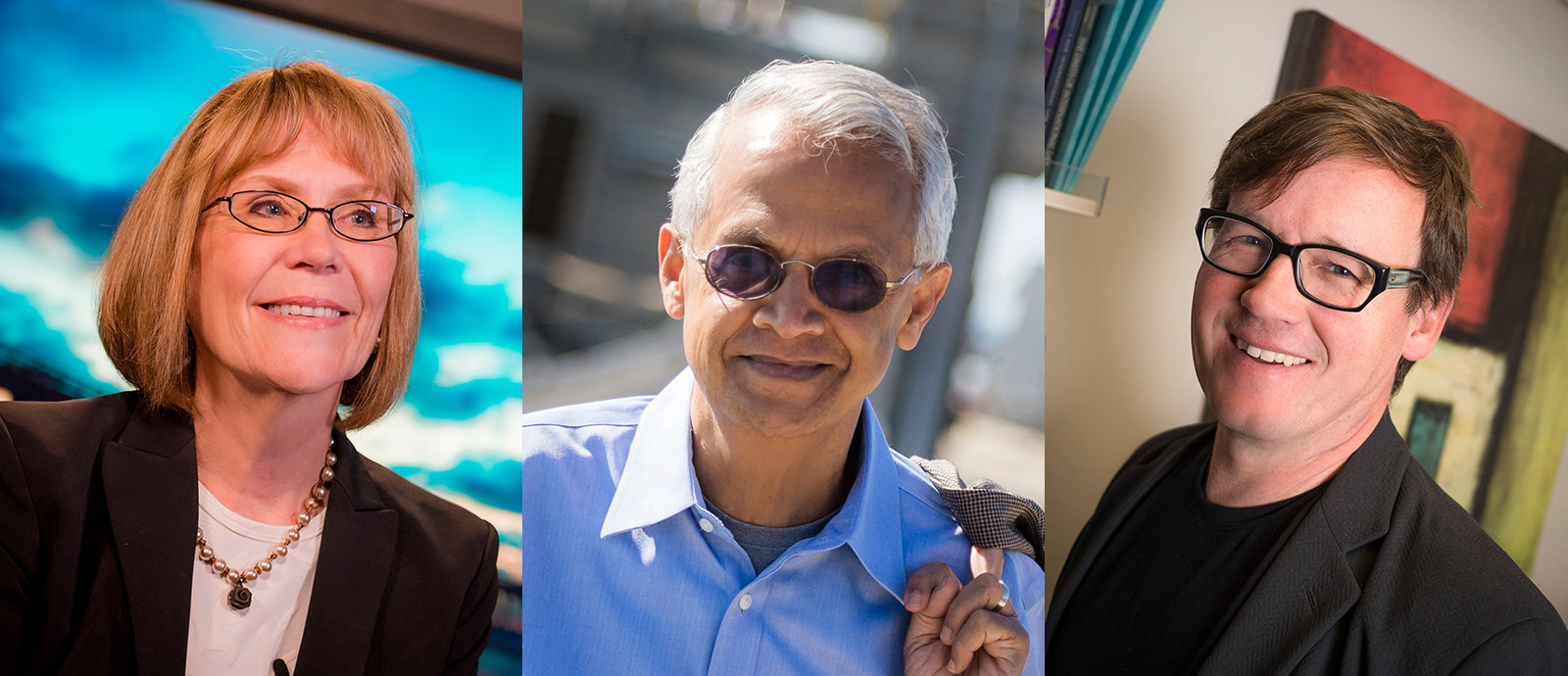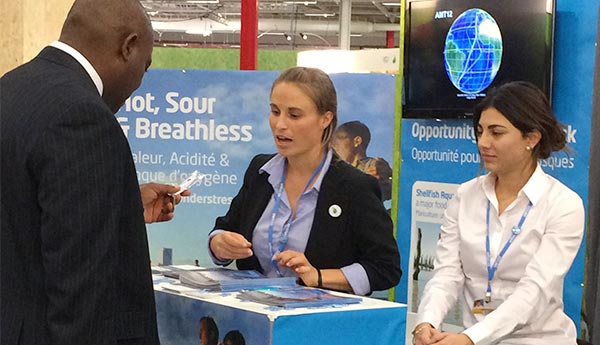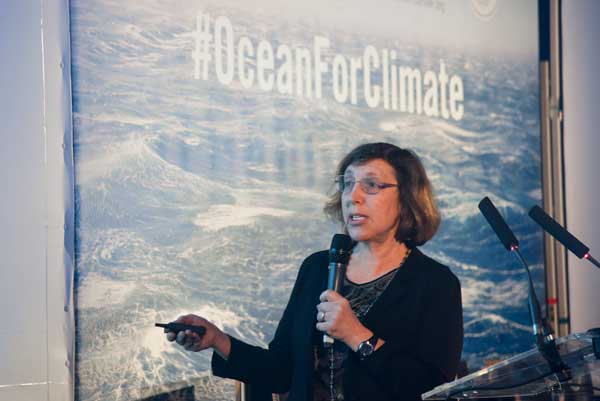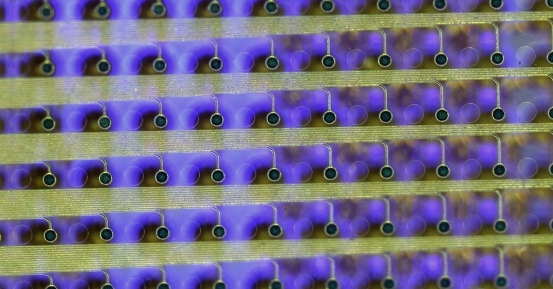
By:
- Robert Monroe
Published Date
By:
- Robert Monroe
Share This:

From L to R, Margaret Leinen, Veerabhadran Ramanathan and David Victor are among the 15 UC San Diego faculty members and students participating in the United Nations Conference on Climate Change in Paris.
Bringing Climate Science into the International Conversation
UC San Diego delegation offers expertise at COP21 climate negotiations in Paris
This week, a delegation of UC San Diego scientists and students began their work of bringing climate science to international climate negotiations in Paris, but there was progress even before the talks formally began.
On Sunday, the day before the formal launch of the two-week event, the University of California announced it would be the sole institutional investor in the Breakthrough Energy Coalition, a collaboration to spur clean energy development led by Bill Gates that includes several billionaire investors ranging from Mark Zuckerberg to George Soros.

Scripps graduate student Mariela Brooks (left) and GPS master’s student Shayla Ragimov describing UC San Diego research to a COP21 attendee.
The UC San Diego contingent of 15 researchers and students includes Veerabhadran Ramanathan, a climate and atmospheric scientist at Scripps Institution of Oceanography who spearheaded an October summit on the University of California’s plan to go completely carbon-neutral by 2025. The event featured appearances by University of California President Janet Napolitano, who was present in Paris to make the announcement.
“As the only university partner in Bill Gates’ Breakthrough Energy Coalition, the University of California has an unprecedented opportunity to implement its recently published 10 scalable solutions for bending the global warming curve,” said Ramanathan. “This coalition can potentially be transformational to keep warming under 2 degrees C.”
UC San Diego researchers have traveled to the Conference of the Parties or COPs, as United Nations-sponsored international climate negotiations are known, since 2001 accredited as a non-governmental organization called the UC Revelle Program for Climate Science and Policy. This year, seven UC San Diego scientists and eight students whose specialties range from biological oceanography to climate policy are in attendance.
Though the goal of the negotiations is for countries to agree to legally binding targets for greenhouse gas emissions, success at COPs is measured in different ways. Observers of the process said this event, called COP21, is as much about the cues that the global industrial and policy community takes from the final outcome of negotiations about doing business going forward as from a COP21 treaty itself.
For individual students and researchers, attendance at COPs is an opportunity to interact with the global policymakers whose actions they may have spent their academic careers studying or to have face-to-face encounters with representatives of nearly 200 countries who have little education on issues such as ocean acidification or deoxygenation, both of which are specialties of Scripps Oceanography.
“You could not find a better target audience,” said Yassir Eddebbar, a fifth-year Ph.D. candidate in oceanography at Scripps, who has attended three other COP conferences in addition to this year’s event. “While working at the Scripps booth, you can interact with delegates from dozens of countries within a couple hours. The gap in awareness of ocean topics in these meetings is concerning, and highlights the importance of the presence of ocean scientists in these conferences."

Scripps biological oceanographer Lisa Levin
Events are taking place throughout Paris related to COP21, which is being held at the location of a former airport called Le Bourget on the outskirts of the city. On Tuesday, Scripps biological oceanographer Lisa Levin was part of a side conference on climate’s ocean impacts held on the banks of the Seine hosted by private advocacy group Tara Expeditions.
With other speakers, she presented a litany of findings about the extent of problems faced by the oceans as excessive carbon dioxide absorption makes them warmer, more acidic, and less oxygenated. Levin concluded that the last of these conditions makes biodiversity loss in the oceans inevitable. That said, she concluded that there are changes society can make to reverse or at least slow the trend of degradation. Education, she said, is as important as increased study.
“We need to ensure that the next generation cares about this,” she said.
Levin’s is one of three research themes that UC San Diego academics are advancing at COP21. The UC San Diego contingent will co-host with the government of Chile a side event on Dec. 5 focusing on the state of climate change impacts on the oceans that will feature talks from Levin and other scientists. Representatives from Chile will focus on recent efforts in protecting marine regions and mitigation measures that could serve as a model for other countries.
The side event is one of hundreds of UNFCCC-sanctioned events that take place at the COP21 venue, Le Bourget. Side events are intended to be platforms for NGOs to brief negotiators on myriad aspects of the climate change issue.
David Victor, a professor of international relations at UC San Diego’s School of Global Policy and Strategy (GPS) and director of the Laboratory on International Law and Regulation, is also at the Paris talks. Victor said that his observations of early COP meetings led him to believe they would lead inevitably to inaction, a process he described in his 2011 book “Global Warming Gridlock: Creating More Effective Strategies for Protecting the Planet.”
“That’s what we’ve seen all the way through the Copenhagen conference (COP15) in 2009,” said Victor. “When that conference ended in failure, it also opened a space for countries to try new strategies and ideas. That included a larger role for “bottom up” approaches in which countries would set their own policies—giving them flexibility to tailor their contributions to what they were willing and able to do at home. For years, I have thought that kind of approach would be more effective, and in Paris, we will see it on display. So that’s why I am going—to see how countries grapple with this new system and because I think, finally, it will have an impact.”
In all, more than 30 researchers and students from throughout the University of California system are expected to attend COP21, which concludes on Dec. 11.
The UC San Diego delegation is presenting news throughout COP21 via its website and several social media channels. Researchers will be live-Tweeting from the event through the feeds @scripps_ocean and @ucrevelle.
Share This:
You May Also Like
Stay in the Know
Keep up with all the latest from UC San Diego. Subscribe to the newsletter today.


